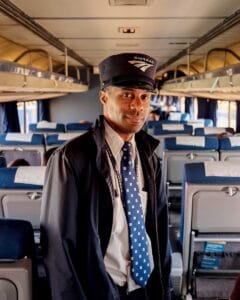Canada Sponsorship
Train Conductor Is Urgently Needed In Canadian National Railway – Chambord, QC

Job details
Location: Chambord, QC
Salary: $15.50 an hour
Job type: Full Time , Part time
Shift/Hours: Morning, night, overnight
Train Conductor
Enjoying physical labour, teamwork and working outdoors as well as being safety-minded are vital to a career in rail operations at CN. With a vibrant, 24/7 schedule, no two days will ever be alike. You can expect fresh challenges, a safety-focused work environment, paid training and supportive colleagues who share your passion for motion. The careers we offer are meaningful because the work we do matters. Join us!
Conductors work as members of two or three person train crews and perform duties associated with the movement of trains, rail cars, and locomotives in rail yards and on the road. They coordinate the assembly of trains and execute any ground work outside the locomotive cab while in the yard or en-route (ex: operating track switches, picking up rail cars, making emergency repairs, etc.).
Responsibilities
The statements in this section are essential job functions that an employee must be able to perform with or without accommodations in order to achieve the objectives of the Conductor job.
- Ensuring compliance with all train orders, signals, railroad rules and regulations related to safety and operations
- Providing and receiving various forms of oral and printed instructions concerning the movement and placement of rail cars
- Assembling/dismantling trains in the rail yard, and picking up/setting off rail cars en-route
- Observing, interpreting, and relaying signals to ensure safe train and locomotive movement
- Operating track switches to change locomotive and rail car routes
- Inspecting the condition of a train and equipment
- Making effective decisions when in unfamiliar locations or emergency situations
- Communicating effectively with the Rail Traffic Control centre, other train crews and other departments on a regular
- basis via handheld radio
Training
Successful applicants will participate in an intensive paid training program that includes 11 weeks of training (7 weeks classroom at the CN Campus in Winnipeg, MB and 4 weeks field training). CN now offers an enhanced and extremely competitive training rate. Expenses related to transportation, accommodation and meals while in Winnipeg are covered by the company.
After these initial 11 weeks, candidates will complete a minimum of 45 trips as an extra person on a crew to enhance their knowledge and skills. Successful completion of the entire training program is mandatory in order to work as a Conductor, and includes written exams and field training (including physical requirements).
Working Conditions and Physical Requirements
- Working a flexible schedule with regular and predictable attendance, in line with the 24/7 railroading environment
- (includes night, weekend, holiday work hours, some overtime, and being away from home for extended periods of time)
- Pushing, pulling, lifting and carrying up to 90 pounds
- Working outdoors in varying weather and environmental conditions
- Operating various devices on rail cars and locomotives, such as uncoupling levers and handbrakes
- Climbing on and off ladders of moving rail cars
- Grasping and holding objects while riding the side of a train
- Walking for frequent extended periods
- Bending, stooping, squatting, and kneeling frequently
- Meeting medical fitness requirements for the position, including those established by the Railway Association of Canada, such as the ability to recognize and distinguish between the colors of signals
Other Requirements
- Writing and passing safety and rules exams. (Note: As per collective agreement, subsequent mandatory Locomotive
- Engineer qualification to retain seniority/employment.)
- High school diploma or GED
- Obtaining and maintaining Conductors Rule Card
- Possessing and maintaining a passport allowing entry/re-entry to the Canada and the United States (in certain specific locations)
- Proficiency in both oral and written communications
Assets
- Completion of college or vocational/technical school and/or Freight Conductor experience
- Relevant work experience in similar working conditions or regulatory/safety environment
- Possessing and maintaining a valid driver’s license
About CN
CN is a world-class transportation leader and trade-enabler. Essential to the economy, to the customers, and to the communities it serves, CN safely transports more than 300 million tons of natural resources, manufactured products, and finished goods throughout North America every year. As the only railroad connecting Canada’s Eastern and Western coasts with the Southern tip of the U.S. through a 19,500 mile rail network, CN and its affiliates have been contributing to community prosperity and sustainable trade since 1919. CN is committed to programs supporting social responsibility and environmental stewardship. At CN, we work as ONE TEAM, focused on safety, sustainability and our customers, providing operational and supply chain excellence to deliver results.
At CN, we are dedicated to building North America’s safest, most inclusive and sustainable railroad, which includes reflecting the communities in which we operate. Research shows that candidates from underrepresented groups often don’t apply unless they feel they fit the job posting at 100%. Even if you don’t see yourself in every job requirement listed in a posting, we still encourage you to apply. If you require an accommodation for the recruitment process (including alternate formats of materials, accessible meeting rooms or other accommodations), please reach out to our team at cnrecruitment@cn.ca.
As an equal employment opportunity employer, all qualified applicants will receive consideration for employment without regard to race, color, religion, sex, sexual orientation, gender identity, national origin, disability, protected veteran status, and other protected status as required by applicable law. We thank all applicants for their interest, however, only candidates under consideration will be contacted. Please monitor your email on a regular basis, as communication is primarily made through email.
What skills and qualities are important for a Train Conductor?
Skills and qualities that are important for a Train Conductor include:
- Knowledge of Railway Operations: Train Conductors need a thorough understanding of railway operations, including knowledge of train safety rules, operating procedures, and regulatory requirements. They should be familiar with the various types of trains, signals, track layouts, and communication systems used in rail transportation.
- Attention to Detail: Train Conductors must pay close attention to detail to ensure the safe and efficient operation of trains. They need to accurately interpret signals, track conditions, and train schedules. Attention to detail is critical for identifying and reporting any anomalies or safety hazards during train operations.
- Decision-Making and Problem-Solving: Train Conductors must make quick decisions and solve problems in real-time, especially when faced with unexpected situations such as equipment malfunctions, weather disruptions, or operational delays. They need to assess the situation, determine the appropriate course of action, and communicate effectively with other crew members and railway officials.
- Communication Skills: Effective communication is essential for Train Conductors to relay information clearly and accurately to crew members, dispatchers, and passengers. They need to communicate train orders, safety instructions, and any updates or changes to the schedule. Strong communication skills are also important for interacting with passengers and addressing their inquiries or concerns.
- Situational Awareness: Train Conductors should maintain a high level of situational awareness at all times. They need to be aware of their surroundings, monitor train operations, and anticipate potential safety risks or hazards. Situational awareness helps them respond effectively to emergencies or unexpected events.
- Leadership and Teamwork: Train Conductors often work as part of a team that includes other conductors, engineers, and railway personnel. They should possess leadership qualities to coordinate and direct the crew members during train operations. Effective teamwork and collaboration with other crew members are crucial for maintaining a safe and efficient operation.
- Customer Service: Train Conductors interact directly with passengers and play a role in providing a positive customer experience. They should have good interpersonal skills, patience, and the ability to handle passenger inquiries or concerns with professionalism and empathy.
- Physical Fitness: Train Conductors may be required to perform physically demanding tasks, such as climbing ladders, walking long distances, or coupling and uncoupling train cars. Physical fitness and stamina are important for carrying out these duties safely and effectively.
- Adaptability and Stress Management: Train Conductors often work in a dynamic and unpredictable environment. They should be adaptable, able to handle unexpected changes, and manage stress effectively. This includes staying calm and making sound decisions even in high-pressure situations.
- Commitment to Safety: Train Conductors have a vital role in ensuring the safety of passengers, crew members, and the overall railway system. They must be committed to following safety protocols, rules, and regulations, and promoting a safety-first culture.
These skills and qualities are crucial for Train Conductors to carry out their responsibilities effectively and contribute to safe and efficient train operations.
What education and certification are required to become a Train Conductor?
The specific education and certification requirements to become a Train Conductor can vary depending on the country, railway company, and regulatory standards. However, here are some general requirements:
- High School Diploma or Equivalent: Most train conductor positions require a high school diploma or equivalent as a minimum educational requirement. A solid foundation in mathematics, communication, and problem-solving skills is beneficial.
- On-the-Job Training: Train conductors typically undergo extensive on-the-job training provided by the railway company or organization they work for. This training covers topics such as railway operations, safety protocols, emergency procedures, customer service, and specific company policies.
- Regulatory and Company-Specific Certifications: Train conductors may need to obtain specific certifications to comply with regulatory requirements and company standards. These certifications may include:
- Railway Rules and Regulations: Train conductors must pass examinations or training programs to demonstrate knowledge of railway rules, regulations, and operating procedures specific to the region and railway company.
Safety Training: Depending on the jurisdiction and company, train conductors may be required to complete safety training courses, such as those focused on first aid, emergency response, hazardous materials handling, and workplace safety. - Operating Rules Certification: Some jurisdictions may require train conductors to obtain operating rules certification, which involves demonstrating proficiency in understanding and applying railway operating rules and procedures.
- Specific Equipment Training: Train conductors may need certification to operate specific equipment such as radio communication systems, on-board computer systems, or other specialized equipment used in train operations.
- Medical Fitness: Train conductors may need to meet certain medical fitness standards to ensure they can perform the physical requirements of the job safely. This can include passing a medical examination that assesses vision, hearing, cardiovascular health, and general physical fitness.
It’s important to note that the specific requirements for education and certification can vary based on the country, railway company, and local regulations. Some countries or regions may have specific educational requirements or require candidates to complete formal training programs. It is recommended to research and consult with the railway company or regulatory authority in your area to determine the exact requirements for becoming a Train Conductor.
What are the career prospects for Train Conductor ?
The career prospects for Train Conductors can vary depending on several factors, including the railway industry’s growth, retirement rates, technological advancements, and specific job opportunities within a region. Here are some considerations regarding the career prospects for Train Conductors:
- Job Stability: The transportation industry, including railways, is essential for the movement of goods and passengers. Train Conductors play a critical role in ensuring safe and efficient train operations. As long as railways remain a significant mode of transportation, there will likely be a need for skilled Train Conductors.
- Retirement and Turnover: The retirement of experienced Train Conductors can create job openings and opportunities for new entrants into the profession. Additionally, turnover can occur as individuals transition to other roles or industries. These factors can increase the chances of job openings for aspiring Train Conductors.
- Industry Growth and Expansion: The growth and expansion of railway infrastructure, both for freight and passenger transportation, can lead to increased demand for Train Conductors. Railways may invest in expanding their networks, upgrading technology, and increasing service frequency, which can create new job opportunities.
- Technological Advancements: The railway industry is evolving with advancements in technology. Automated systems and remote monitoring are being introduced in some aspects of train operations. While these advancements may change the nature of some roles within the industry, there will likely still be a need for skilled Train Conductors to manage and oversee train operations.
- Specialization and Advancement: Train Conductors may have opportunities for specialization or advancement within the industry. This can include roles such as senior conductor, trainmaster, operations manager, or positions in training and mentorship. Advancement opportunities can be influenced by factors such as experience, additional training, and demonstrated leadership and management skills.
- Geographic Considerations: Job prospects for Train Conductors can also depend on the specific region or country. Areas with significant rail networks, industrial activity, or passenger transportation demand may offer more opportunities for Train Conductors. It can be beneficial to explore job prospects in regions with robust railway systems.
It’s important to note that the specific career prospects for Train Conductors can vary based on the local job market, industry conditions, and individual qualifications and experience. Staying updated on industry trends, networking within the railway community, and pursuing relevant training and certifications can enhance career prospects in this field.
Who can apply to this job?
The employer accepts applications from:
- Canadian citizens and permanent or temporary residents of Canada.
- Other candidates with or without a valid Canadian work permit.
How to apply
Online: Apply On Company WebSite
What is the work environment like for Train Conductor?
The work environment for a Train Conductor can vary depending on the type of railway operation, whether it’s freight or passenger transportation, and the specific characteristics of the railway system. Here are some aspects of the work environment for Train Conductors:
🔥Latest Job Vacancies in Canada (Updated Daily)
🇨🇦 Child Caregiver Needed in a Private Home (SPONSORSHIP AVAILABLE) – Ontario
Apply Now🇨🇦 200+ Sponsorship Visa Jobs and Work Opportunities in Canada – APPLY NOW
Apply Now🇨🇦 Work For Foreigners: Personal Support Worker (SPONSORSHIP AVAILABLE) – Ontario
Apply Now- Trains and Railways: Train Conductors primarily work on trains and within the railway system. They operate in a dynamic and mobile environment, moving across various sections of the railway network. This can include urban areas, rural regions, and potentially across different geographic locations.
- Irregular Hours and Shift Work: Train Conductors often work irregular hours, including evenings, weekends, holidays, and overnight shifts. Railways operate around the clock, so schedules may involve rotating shifts to ensure continuous service. This can result in a non-traditional work schedule compared to standard office hours.
- Onboard Train Duties: Train Conductors perform their duties on board trains during trips. This involves tasks such as checking tickets, assisting passengers, announcing stations, ensuring safety compliance, and maintaining a comfortable and secure environment for passengers.
- Outdoor Work: Train Conductors may spend a significant amount of time working outdoors, especially during the boarding and disembarking of passengers or when inspecting train cars and equipment. They need to adapt to various weather conditions, including extreme temperatures, rain, snow, or heat.
- Safety Focus: Safety is of paramount importance in the railway industry, and Train Conductors play a crucial role in ensuring safe operations. They need to be vigilant, follow safety protocols, and effectively respond to emergencies or potential hazards during train operations.
- Collaborative Environment: Train Conductors work as part of a larger team, which includes other conductors, engineers, dispatchers, and railway personnel. They need to communicate and collaborate effectively with their team members to coordinate train operations, address issues, and ensure the smooth functioning of the railway system.
- Customer Service: For Train Conductors working on passenger trains, customer service is an essential aspect of their role. They interact with passengers, provide information, assist with boarding and disembarking, and handle inquiries or issues in a professional and courteous manner.
- Physical Demands: The work of a Train Conductor can involve physical demands such as standing, walking, climbing stairs, and moving through train cars during the journey. They may also need to handle heavy equipment or assist passengers with their luggage. Physical fitness and stamina are important to carry out these duties effectively.
- Travel and Overnight Stays: Depending on the railway route and schedule, Train Conductors may have to travel for extended periods, which can involve overnight stays away from home. They should be prepared for the potential for travel and temporary accommodations.
It’s important to note that the work environment for Train Conductors can be fast-paced, requiring alertness, multitasking, and the ability to adapt to changing circumstances. The specific work environment can vary based on the type of train service, the nature of the railway operations, and the specific routes and schedules involved.











